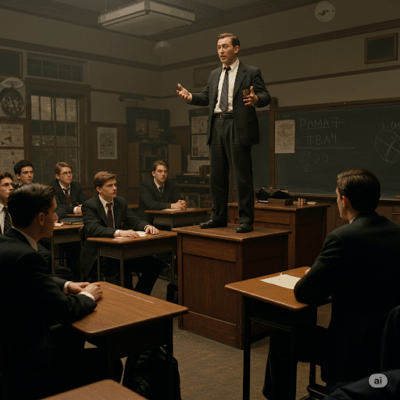Literary Review of Dead Poets Society: A Timeless Tale of Nonconformity and Self-Discovery
“Dead Poets Society” stands as one of the most compelling and beloved films of the 20th century. Set at the prestigious Welton Academy for Boys in 1959, this powerful drama invites us into a world where tradition and conformity reign supreme—until an unconventional English teacher arrives to challenge everything these young men have been taught to believe.
A Clash of Philosophies
The film centers on a group of adolescent boys who have been sent to this elite preparatory school to follow a predetermined path toward success. Most attend reluctantly, under pressure from parents with lofty expectations. Their structured lives are suddenly disrupted by the arrival of Mr. John Keating, brilliantly portrayed by Robin Williams, whose teaching philosophy directly contradicts the school’s rigid ideology.
Mr. Keating doesn’t just teach English—he inspires a revolution of thought. “Carpe diem,” he urges his students. “Seize the day. Make your lives extraordinary.” Through poetry and passionate instruction, he encourages them to think independently, to “march to the beat of their own drummer,” and to “suck the marrow out of life.” Most importantly, he warns them against the dangers of mindless conformity.
The Revival and Its Consequences
Inspired by Keating’s teachings, a group of students resurrect the “Dead Poets Society,” a secret club their teacher belonged to during his own days at Welton. In the sanctuary of a cave in the woods, they read poetry, share their dreams, and begin to discover their authentic selves. This awakening of individuality, however, comes at a cost.
No character suffers more profoundly from this clash between personal desire and external expectations than Neil Perry. When Neil discovers his passion for acting and joins a local production of “A Midsummer Night’s Dream” against his domineering father’s wishes, the consequences are devastating. Faced with his father’s ultimatum—military school and a future without theater—Neil makes the heartbreaking decision to end his life rather than surrender his newfound sense of self.
The film culminates in one of cinema’s most emotional scenes: as Mr. Keating is forced to leave the school, his students stand on their desks in defiance, addressing him one final time as “O Captain! My Captain!” in a powerful tribute to Walt Whitman’s poem and to the teacher who changed their lives forever.
Cinematic Excellence
What elevates “Dead Poets Society” to greatness is its masterful execution of fundamental storytelling elements. Director Peter Weir creates a world that feels completely authentic to its 1959 setting, with only the most minor of anachronisms (like a halogen bulb that most viewers would never notice). The cinematography captures both the oppressive grandeur of Welton Academy and the natural beauty of its surroundings, reflecting the contrast between institutional constraint and personal freedom.
The characters are not merely believable but profoundly relatable. Each student represents a different response to authority and different aspects of the struggle for self-determination. Whether it’s the shy Todd Anderson finding his voice, the rebellious Charlie Dalton embracing nonconformity, or the conflicted Knox Overstreet pursuing forbidden love, viewers will recognize aspects of themselves in these characters.
Universal Appeal with Emotional Depth
What makes “Dead Poets Society” resonate across generations is its exploration of universal themes. The tension between societal expectations and personal fulfillment speaks to our collective experience. Most people understand what it means to feel constrained by others’ expectations and yearn for freedom. The film challenges us to consider how much of our lives is truly our own and inspires us to live more authentically.
Unlike many contemporary films that rely heavily on special effects to compensate for thin plots, “Dead Poets Society” engages audiences through its emotional depth and thought-provoking themes. It demands reflection but rewards viewers with genuine insight into the human condition.
The Lasting Impact of Mr. Keating
At the heart of the film’s enduring appeal is the character of Mr. Keating. Through his unconventional teaching methods—having students stand on desks for a new perspective, ripping out textbook pages that reduce poetry to technical analysis, and encouraging physical expression of emotion—he embodies the film’s central message: that life should be approached with passion, curiosity, and courage.
“Dead Poets Society” isn’t just a film to watch; it’s an experience that challenges us to examine our own lives. It reminds us that, in a world that often demands conformity, our unique voices matter. It’s a cinematic treasure that continues to inspire audiences to seize their own days and make their lives extraordinary.
